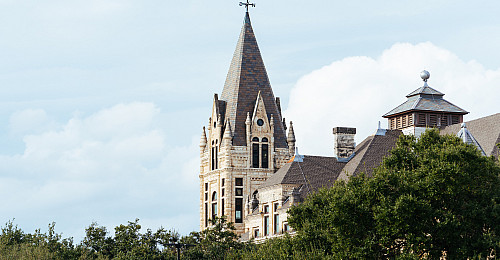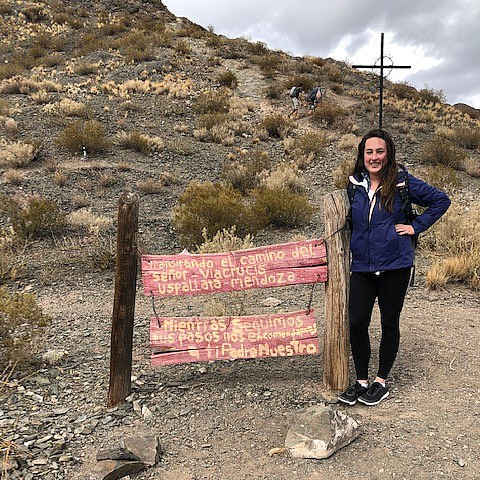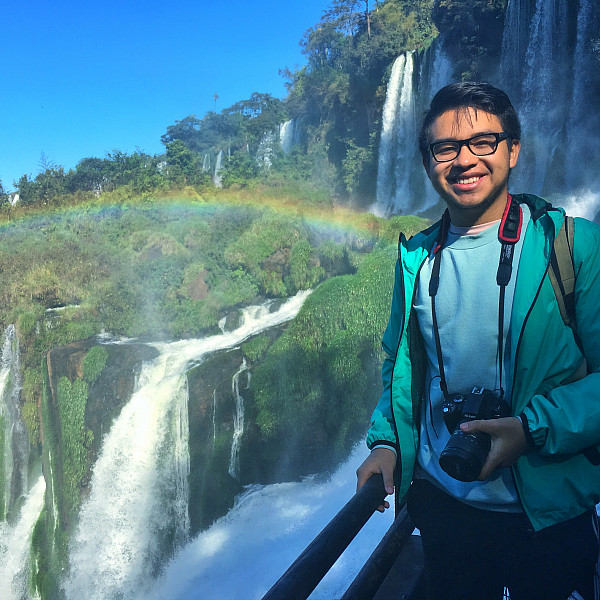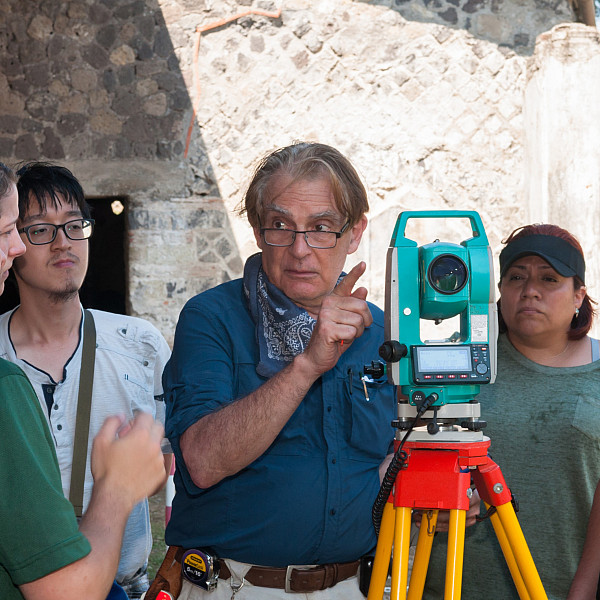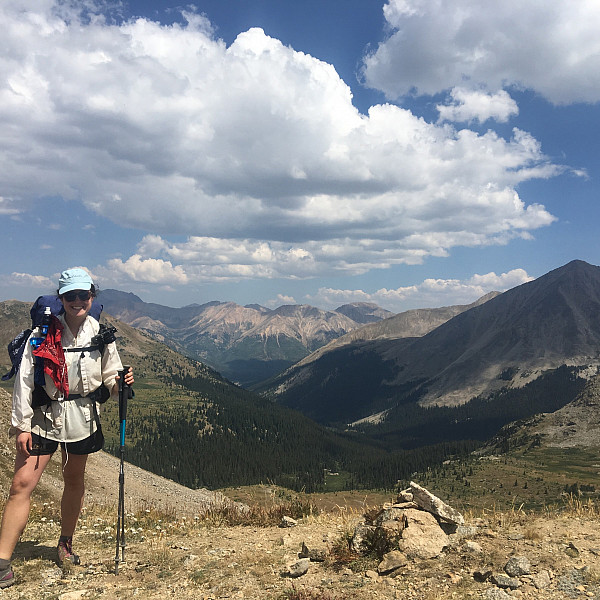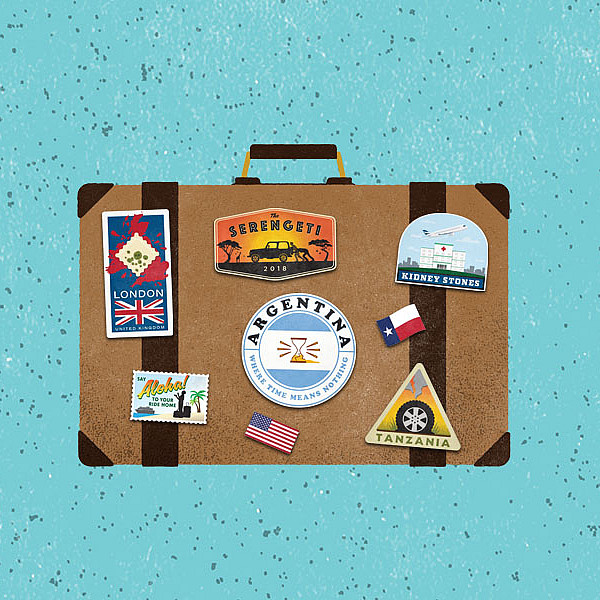News
Incredible Journeys
Southwestern students, staff, and faculty learn—and grow—abroad.
August 02, 2019
August 02, 2019

Credit: Joshua K. JacksonCortney Graves ’12 was going to be a lawyer. She had it all planned out: After receiving her degree in international studies and political science, she would enroll in law school and become a prosecutor. This had been her goal since middle school, when she spent a day at the Williamson County Justice Center watching trials, speaking with judges and attorneys, and discovering how fascinating the field of law can be.
Then she spent the spring semester of her junior year studying politics and the Chinese language in Beijing, China. Suddenly, her life took a different turn.
“I had never been out of the U.S. before,” says Graves, who taught in Myanmar for a year after completing her degree. “I discovered that I had a passion for everything international.”
Today, Graves helps Southwestern students prepare for their own potentially life-altering study-abroad experience as assistant director of intercultural learning. She counsels students on their various options, ensuring they find a program that fits into their degree plan and matches their interests. While she spends most of her time with students before they head off on their adventure, the most rewarding part of her job is seeing how much they’ve grown when they return.
“Students develop independence and leadership skills when they study abroad,” she says. “They come home confident they can navigate tough situations they’ve never had to deal with before, from managing a budget to balancing their personal and academic lives. Some students come back a completely different person.”
New experiences, new skills
Approximately 100–200 Southwestern students study abroad each year. They can choose programs that are taught by Southwestern faculty and are available only to Southwestern students, or they can select programs offered by a third-party provider and attended by students from a number of universities. In total, the University approves more than 1,500 study-abroad programs that allow students to study everywhere from Argentina to New Zealand.
Once students are accepted for a study-abroad experience, they must attend at least two predeparture meetings, in which they learn how to properly and safely conduct themselves abroad. The meetings also cover the challenges they may encounter. “Studying abroad is uncomfortable. You don’t know all the rules. You may not know the language. You have to figure things out,” says Tisha Korkuś, director of intercultural learning. “But mistakes are good. If you aren’t making mistakes, you aren’t learning anything.”
Korkuś herself studied abroad, first in Argentina for a year in high school and later in Costa Rica for a semester in college. The experiences greatly affected her both personally and professionally.
“It would be easier to say how I wasn’t impacted than how I was,” she says.
Korkuś notes that in today’s interconnected world, studying abroad gives students an advantage when they enter the workforce.
“You learn how to interact with people who are different from you. Every workplace you encounter will have people from different cultures,” she says. “You also learn how to be flexible and adaptable. When you’re studying abroad and your train breaks down or there’s a delay on the subway, you solve the immediate problem and then make better decisions in the future, like leaving earlier next time.”
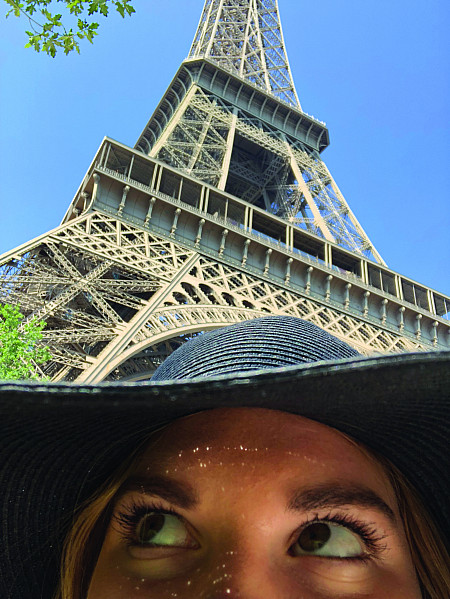
Sarah Brackmann, senior director of integrative and community-engaged learning, supervises the Office of Intercultural Learning as well as the Office of Community-Engaged Learning, which encourages students to seek out opportunities outside of campus to engage and connect with the community. Both offices connect students to other learning spaces that promote student integration of knowledge, she notes.
“Studying abroad provides students with a rich, engaging experience,” Brackmann says. “Academically, it provides a multidimensional, critical-thinking education. Personally, it allows students to understand who they are and forces them to think about their own biases, perspectives, and prejudices.”
Both Korkuś and Brackmann point out that students need to be aware of one common side effect of studying abroad: a persistent urge to travel.
“Studying abroad tends to be contagious and habit-forming,” Korkuś says. “I tell students they need to be prepared for the travel bug to be well lodged.”
The joy of discovery
Southwestern’s most popular study-abroad option is the SU London program, a 15-week, 16-credit program offered during the fall semester. Two different faculty members lead it each year, resulting in a unique focus every time. In 2018, courses were offered in Spanish and business; in 2019, they will revolve around art history and philosophy.
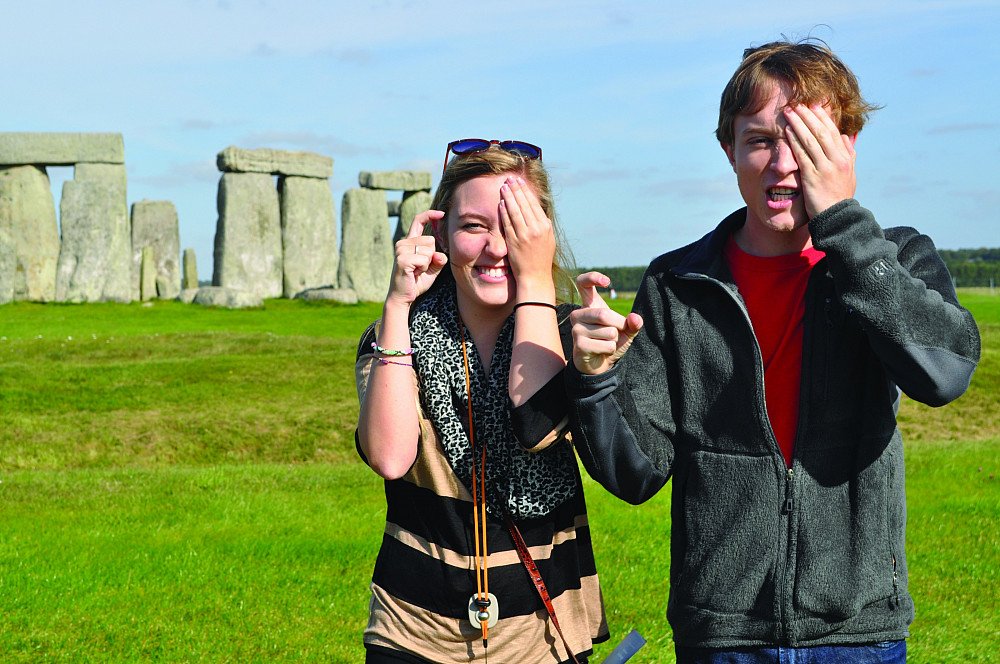
Katy Ross, professor of Spanish, and her husband, Andy, assistant professor of
business and director of business internships, led the 2018 program. Ross hadn’t been to London in 18 years, so she felt like she got to experience the city for the first time all over again with the 28 students who participated in the program.
“The beauty of teaching is the ability to see things through your students’ eyes as they learn them,” Ross says. “It’s the joy of discovery. I get to live that again.”
This summer, Ross will teach abroad in one of her favorite locales: Granada, Spain. In 2007, she established the SU Spain program, a six-week, eight-credit program held every other summer. She believes this program in particular has helped her grow as a professor.
“If you teach students about Spain and you don’t go to Spain, you’re teaching them book knowledge,” Ross says. “By visiting frequently, I’m able to bring a very personal, very intimate knowledge of Spain into my classroom. It’s like a second home to me now.”
Ross notes that studying abroad allows students to step outside their norms and experience life in a different way. “This is the ultimate college experience to have. I think that college is a time of self-discovery for our students, and there’s no better way to discover yourself than to take yourself out of your comfort zone and study abroad,” she says.
Associate Professor of Communication Studies Valerie Renegar agrees. Renegar, who will lead the SU European Cultural Exploration program this summer, has taught abroad three times in the course of her career.
“This is a transformative educational opportunity,” Renegar says. “You don’t look back and regret it.”
The SU European Cultural Exploration Program is unique in that students will study in three locations: Lisbon, Portugal; Grenoble, France; and Budapest, Hungary. Renegar says it has generated a lot of student interest, partly because it is taught in English and partly because students can complete two courses during the summer, which helps justify the cost.
“Students develop independence and leadership skills when they study abroad. They come home confident they can navigate tough situations they’ve never had to deal with before.” – Cortney Graves ’12
Renegar notes that studying abroad has a reputation for being expensive, but that’s not always the case. Many programs cost about the same as a regular semester (plus airfare), and scholarships are available. But if cost is an issue, it shouldn’t be, she believes. “If there’s ever any reason to take out a student loan, it’s for a study-abroad trip,” she says.
Teaching abroad gives Renegar a sense of professional renewal. It makes her excited about teaching, and she enjoys seeing students develop as scholars.
“I get to introduce them to a huge new experience and watch them immerse themselves in a new culture,” she says. “You can’t replicate
that in a classroom.”
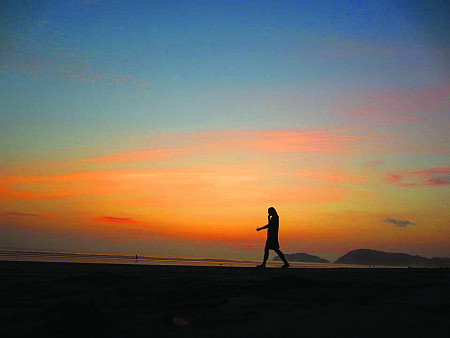
Southwestern also supports students and faculty members who want to research off-site. These experiences often are just as intense.
Bob Bednar ’89, associate professor of communication studies, has been doing fieldwork since graduate school. At first, the work satisfied his itch to travel. “I was an outdoors person and a reluctant academic when I started. I didn’t see myself in basements and closed spaces,” he says.
Much of Bednar’s work has focused on roadside car crash shrines and their connections to how individuals negotiate public spaces. He has visited these sites across the American West, as well as in India, the U.K., New Zealand, and Canada. Seeing them in person has had a profound effect on both his research and how it is perceived.
“I learn things I can’t imagine on my own by encountering realities I can’t imagine on my own,” Bednar says. “It gives me a lot of credibility. I am able to bring my experience to the audience, and the reader’s experience is less mediated as well.”
Professor of Anthropology Melissa Johnson P’19, P’21 also researched off-site while in graduate school. A professor asked her if she was interested in serving as a research assistant in Belize, and she jumped at the opportunity. The experience did much more than simply change her life.
“I fell in love with someone there. It created my life—my husband and my kids,” Johnson says. “It transformed everything.”
Johnson has taught abroad multiple times since that first fateful trip. She Sympathizes with students who feel out of place when they start their programs.
“This is the ultimate college experience….There’s no better way to discover yourself than to take yourself out of your comfort zone and study abroad.” – Professor Katy Ross
“The first time, I felt like a fish out of water. Roosters would make noise all night long. I couldn’t sleep; I would be in tears,” she says. “Now I don’t even hear them.”
Johnson believes that, ultimately, the discomfort is a good thing.
“Students understand who they are better when they’re thrown into a new cultural context. They gain confidence and a sense of self,” she says. “They also develop a more sophisticated understanding of global issues and a more nuanced ability to describe people and experiences. Studying abroad is simply an amazing opportunity.”
Southwestern Faculty Research Abroad
Below are a few examples of projects SU faculty have completed or are currently working on during research trips abroad:
- Professor of Political Science and Dean of the Faculty Alisa Gaunder published her book Japanese Politics and Government (2017), a comparative examination of postwar political institutions, reform, and policy making in Japan.
- Professor of Art and Art History and Chair of Art History Thomas Noble Howe has published numerous articles and books about recent and ongoing excavations in Italy as the coordinator general of the Restoring Ancient Stabiae Foundation. One of his latest articles is “The Social Status of the Villas of Stabiae.”
- Professor of Biology Romi Burks specializes in the ecology, diversity, and distribution of apple snails in Uruguay, publishing her findings in such journals as Malacologia, PLOS One, and Freshwater Science.
- Assistant Professor of History Jethro Hernandez Berrones recently presented “Teaching Medicine to the Working Class: Private Medical Schools in Revolutionary Mexico, 1910–1940” in Guadalajara, Mexico, and his book A Revolution in Small Doses: Homeopathy, the Medical Profession, and the State in Mexico, 1893–1942 is forthcoming.








